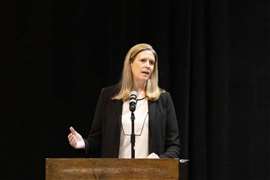Interview: EIC President Duccio Astaldi
07 December 2012

If you had to sum up in one word what is on new European International Contractors (EIC) president Duccio Astaldi’s mind, the answer would be ‘fairness’. Concerns held by the trade association and its president, which represent the interests of European contractors working outside their national boarders, range from the familiar – pressure in home and overseas markets by state-owned Chinese contractors – to new and worrying trends for clients to force unacceptable risks on construction companies with unfair contracts, both internationally and within Europe.
At its October General Assembly in Vienna, Austria, EIC held a workshop entitled “Challenging construction markets in Central and South Eastern Europe: Can we do better and what does it take?”
At the event, EIC called on the European Commission and the European Investment Bank (EIB), who were both represented on the workshop panel, to scrutinise more closely the administration of EU Structural funds by the Member States, particularly in the regions discussed.
In Vienna, there was a feeling among the delegates that project funders like the EU, EIB, World Bank and other development organisations should take greater efforts to prevent mismanagement and corruption on the projects they fund. However, EU Institutions and development banks are not the clients for the projects they fund, and as schemes take place in recipient countries, the funders argue they cannot act as the police.
The Chinese question
But this is not what is being called for. “We need a clean market,” said Mr Astaldi, adding that otherwise international contractors that comply with OECD rules and regulation are at a disadvantage from outside the OECD area. “The trouble is that development banks are not taking the responsibility to monitor what is done with their funds,” he said.
He argues that since development banks are public bodies handing tax payers’ money to third party clients, they need to ensure that the money is spent in a responsible manner.
“It does not make sense to implement anti-corruption measures in Europe and the US, but to not even monitor what happens to public funds when they are go to other regions for development.”
Another long-running bone of contention for EIC is the growing presence of state-owned Chinese contractors in international markets, especially when it comes to competing for development projects.
“European contractors want to compete on a fair basis with Chinese contractors on development projects in other countries”, said Mr Astaldi. “However, it is difficult to compete with a state-sponsored entity that can always put in a lower bid if the price is the sole criteria.”
Furthermore, Chinese contractors tend to import all their own labour, materials and equipment for overseas projects from mainland China. “But we think that is a very limited vision of development because the money that has been put forward for development, either by multilateral or bilateral donors under international competitive bidding or by the Chinese government under tied aid arrangements, ultimately ends up back in China.
“European contractors tend to take a different approach. We employ and train more local people, so not only do we add skills, but the development funds stay in the local economy,” said Mr Astaldi.
But does this all really matter? If the aim is to get a piece
of infrastructure built, then surely the cheapest price is the
best, and who cares if China is subsidising a project through a cheap bid from a state-owned company? Isn’t that a good thing?
Not necessarily, argues Mr Astaldi, if you take a broader view of what development means for the partner country.
“What is development?” he asked. “Is it to have a road or to develop a country to build the next road with its own capabilities. If you go on a Chinese contractor’s jobsite, you mostly see Chinese people. When we as European contractors go to these places, we use high numbers of local people and a minimum of expatriates. We train the local workforce on the job and provide them with skills. So when we leave, we leave thousands of people who are more able to do things for themselves like starting small businesses and taking on projects themselves.
“That’s my vision of development. If you just want a low price, that’s fine, but you won’t get the same benefits.”
But besides the issue of a level playing field for European and other developed-world contractors, Mr Astaldi believes governments are storing up problems for the future by accepting such low prices.
“We see examples that, in the long term, the prices of our Chinese competitors are not cheap”, he said, explaining that in Africa many Chinese firms had put in very low bids at first to break the competition. At present they can be “More expensive than European contractors because they have removed our capacity to work in the region.”
But there is perhaps hope for the EIC and its cause, as the World Bank is currently reviewing its procurement procedures. “The organisation is split, with the developing countries favouring the lowest possible price as main criterion and the Western countries taking a broader view of development and opting for the most economically advantageous price,” said Mr Astaldi.
Furthermore, countries like the Netherlands have also put forward concepts such as green procurement, sustainability and environmental issues into the debate.
A further aspect of this procurement review is that development banks should insist on fair contract conditions in projects they fund. The issue of unfair contract conditions was a hot topic at EIC’s Vienna General Assembly, with concerns being raised that clients, including governments and public sector bodies, were using the tough economic environment to push more and more risks onto contractors.
“We need fair contract conditions that allocate risks to the right party,” said Mr Astaldi.
It is true that if a contractor is presented with an unfair or onerous contract, no-one is forcing it to bid or take the work. But at the same time this adversely affects competition by removing bidders from the market. “If a serious contractor is forced to cover risks, he should be able to price them, without making his bid uncompetitive.”
Again, Mr Astaldi thinks looking at the big picture provides the answer. “It is not in the clients’ interest to award contracts to unprofessional companies that will put in a low bid to win work or that do not offer a broad idea of development. We need owners to understand the bigger picture.
“The question is not if contractors should walk away from countries with poorly prepared tenders and unfair contract conditions but rather how can clients organise their projects to get the best and broadest competition possible. Opting for the lowest price and imposing unfair contracts does not lead to broad competition and it does not ensure best value for money,” he said.
Summing up his priorities for his term as EIC president, Mr Astaldi said, “We have a lot of things to do, we need to work towards a clean and transparent market with clearly stated rules and fair contract conditions.”







